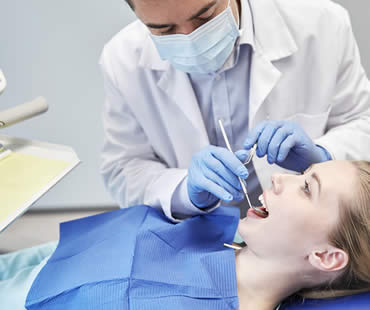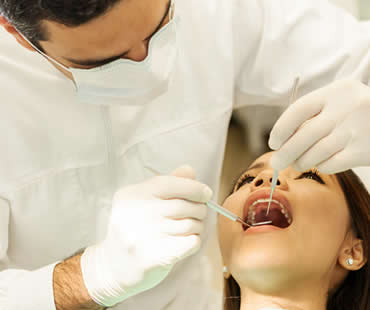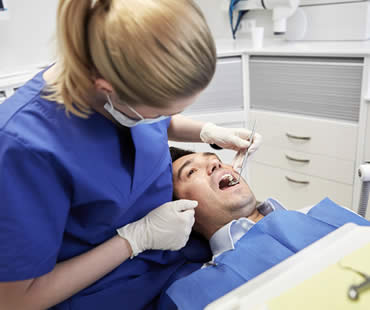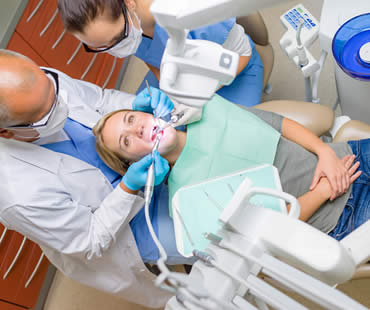
If you didn’t have your wisdom teeth out as a young person, you may be wondering about having them out as an adult. Your dentist may have recommended that you prevent future infections, cysts or pain in the jaw due to wisdom teeth that are growing under other teeth – known as impacted teeth. Even a type of tumor has been linked to impacted wisdom teeth.
Impacted teeth result when the wisdom tooth grows up under an existing tooth. Sometimes, adults have wisdom teeth that come in completely straight behind back molars. In rare cases, one or more of these teeth don’t grow at all. An x-ray can reveal the presence of the teeth. Impacted teeth cause problems with existing teeth and must come out.
Because the roots of wisdom teeth typically fully develop near the age of 24, removing them after this time can be more complicated. Roots can entwine with facial nerves, making extraction problematic. It’s recommended that adults receive a CT scan of their jaw, showing the clear positioning of facial nerves and roots, something not shown by x-rays. If the roots of the lower wisdom teeth aren’t touching or wrapped around the alveolar nerve, extraction is still possible.
Adults with wisdom teeth are at higher risk for gum disease. Gum disease has been linked to an increase of pregnancy complication and other health issues. Previously believed only to affect patients in their late 30s, this gum disease is now being shown to affect much younger patients, especially young pregnant women. Growing evidence is also connecting gum disease to inflammation due to chronic infections in the body, leading to an increased risk of diabetes and heart disease.
Talk to your dentist today to see if you should have your wisdom teeth removed. Be honest about any symptoms you’re having, such as pain or pressure, and let the professional evaluate your specific situation.
Schedule your appointment at our Sicklerville dental office

It is estimated that ten million impacted wisdom teeth are removed every year. This means that you or someone you know has probably experienced this type of oral surgery. Even so, the thought of wisdom tooth extraction strikes fear and apprehension in many people. Knowing more about why it’s necessary and the procedure itself may alleviate your concerns.
Wisdom teeth are the furthest teeth in the back of your mouth, and come in later than all of your other teeth. Sometimes they don’t erupt at all, becoming stuck or impacted in your gums. Even if they do come in naturally, they may not fit in your mouth properly with the rest of your teeth.
There are some common issues that necessitate the removal of wisdom teeth. These include:
- Impaction – impacted teeth may grow sideways and even damage your jawbone.
- Infection – teeth that partially erupt can cause openings in your gums that allow bacteria inside, causing sometimes serious infections.
- Tumors and cysts – complications like tumors and cysts can develop around impacted wisdom teeth, sometimes damaging to the gums and jaw.
- Pressure – impacted teeth can pressure the surrounding teeth, causing abnormal growth, tooth decay, and orthodontic problems.
The best way to avoid these types of issues is to have your wisdom teeth surgically removed. Many dentists recommend removing them even before you’re experiencing problems, so that you avoid problems later. Your dentist may refer you to an oral surgeon. After a consultation and examination including X-rays, a treatment plan will be determined.
Wisdom tooth extraction is an outpatient procedure in the surgeon’s office, using some level of anesthesia. Sometimes only local anesthesia is required, while some cases benefit from deeper levels of anesthesia for your comfort and health. Afterwards, you will experience some discomfort and should follow the doctor’s advice for care. Ice, pain medications, a soft diet, and rest are advised. A follow-up visit will be scheduled to monitor your healing. Typically, you will be back to normal in a few days and won’t have to worry about your wisdom teeth again.
Our dental office is located in Sicklerville

Wisdom teeth are the last adult teeth to erupt into the mouth, generally emerging between the ages of seventeen and twenty-one. They are the third set of molars and are in pairs: two each on the top and bottom arch of teeth. While some patients don’t have wisdom teeth, most do. Many of those who do have them don’t have enough room for those teeth to erupt fully, causing them to be wedged under the back of another tooth, impacted in the gum.
Impacted wisdom teeth are very difficult to clean, and can negatively affect the surrounding teeth. They are highly vulnerable to disease and decay and may lead to tooth pain and damage to adjacent teeth. For these and other reasons, a dentist may recommend that the teeth be extracted through oral surgery as soon as necessary to prevent any problems.
Extraction of wisdom teeth is typically an outpatient procedure done in an oral surgeon’s office. A healthy patient can proceed with a typical surgery, but if any infection is detected, the surgery can’t move forward until the infection is cleared up through the use of a full course of antibiotics. Once the surgery is moving forward, the surgeon’s team will administer some form of anesthesia to numb the area surrounding the tooth or to possibly sedate the patient through IV sedation dentistry.
After the anesthesia has fully taken effect, the surgeon makes an incision to open the gum and to remove any bone that is blocking the tooth from extraction. The tissue connecting the bone to the tooth will be separated and the tooth will be removed. In some cases, the surgeon will have to break the tooth into smaller pieces to make it easier to remove. After thoroughly cleaning the area and removing any remaining debris, the incision will be closed, stitched and packed with sterile cotton gauze to staunch any bleeding.
The surgeon will provide aftercare instructions. Patients should follow these instructions to the letter in order to ensure the best and fastest healing of the surgical site.
We look forward to seeing you in our Sicklerville dental office

Surgery to remove wisdom teeth is one of the most common procedures that oral surgeons and dentists perform. It is important to follow your doctor’s instructions afterwards for the best chances of quick and complete recovery. Here are some tips for taking care of yourself after wisdom tooth extraction.
Watch your diet:
Your dentist will give you a list of suggested foods you can it after surgery, and ones to avoid. Stick with soft or liquid foods for the first couple of days, and do not eat hard or sharp foods like chips. Avoid carbonated drinks, hot beverages, and spicy foods because they can irritate your surgery site. After the first few days, begin introducing your regular diet as is comfortable.
Take your medications:
You will likely receive a prescription for painkillers to help relieve discomfort, as well as reduce swelling. This in turn can lower your risk for infection too. Take your medication as prescribed by your dentist for the optimum results. If your extraction is simple, prescription medication may not be required. You can take over-the-counter medications if your dentist agrees and you follow the directions on the label. Do not take aspirin, however, because it can thin your blood and increase bleeding at your extraction site.
Brush carefully:
Instead of brushing with your toothbrush, gently wipe the site with clean, wet gauze. Rigorous brushing can hurt the healing process, and you should even avoid rinsing your mouth for at least 24 hours after surgery. On the second day, you can rinse your mouth gently with salty water. Do not spit forcefully, which can dislodge the blood clot on your extraction site. Also, do not rinse with mouthwash that contains any alcohol.
Avoid alcohol and tobacco:
Drinking alcohol may thin your blood, prevent clotting, and delay healing. Smoking can have similar effects, as well as dislodge the clot when you inhale on a cigarette. For the best chances of healing, avoid these products for at least 24 hours after wisdom tooth extraction.
If you live in the Sicklerville area contact us today

While not everyone needs to have their wisdom teeth removed, third molars are the most likely to cause you serious dental problems. Monitoring the health of your wisdom teeth, with cooperation from your dental professional, is the best way to avoid serious complications before they arise. The following are indications you may need to consider oral surgery to extract trouble wisdom teeth:
- Wisdom tooth pain could be a result of infection and decay. Third molars are the most difficult to clean, due to their position at the back of the mouth, making them a prime breeding ground for plaque and bacteria which then attacks the tooth.
- If you have a small mouth, the emergence of wisdom teeth can cause crowding of existing teeth. As wisdom teeth appear they may begin to force your other teeth out of the way, causing misalignment. Removing the third molars makes room for existing teeth.
- Wisdom teeth that do not emerge properly can cause irritation to the gums that may lead to gum infections and immense discomfort.
- When wisdom teeth start to emerge at awkward angles, it can cause them to become impacted. Third molars that get stuck in the gums sometimes create pockets that harbor bacteria and debris that cause serious decay and infection, as well as bad breath issues.
While not all wisdom teeth require extraction, there are many complications associated with third molars that indicate removing them would be in your best interest. By monitoring the emergence and ongoing health of your wisdom teeth, you can avoid serious dental problems. Consult with your dentist about the condition of your wisdom teeth to ensure a lifetime of healthy teeth.
Schedule your appointment at our Sicklerville dental office

Your “third molars”, which are the molars in the very back that are the last to erupt, usually start to appear during the late teen years. They may not emerge for everyone, but when they do show up they are often problematic. Most people’s jaws don’t have room for them, and sometimes they are impacted and unable to erupt at all. Here are some common symptoms that you can watch for so you’ll know when your wisdom teeth might be the culprit.
The main thing many people notice is pain as their wisdom teeth develop. These teeth in the far back of your mouth, often two upper and two lower teeth, are very unpredictable. Sometimes they erupt sideways or crooked, causing your other teeth to become misaligned or overcrowded. If your wisdom teeth erupt, you might see them poking through your gums and creating an area of tenderness, inflammation, and redness. It can be painful to eat and brush your teeth. When wisdom teeth pain is very bothersome, dentists usually recommend removing them.
You may be one of the lucky people who don’t experience wisdom tooth pain. However, there are a host of other symptoms associated with these teeth. Some of these include:
- Sore throat
- Fever
- Difficulty swallowing
- Facial swelling
- Nausea
- Pus
- Lymph gland swelling
- Inflamed gums
- Bad breath
- Problems chewing and brushing
- Cysts around impacted wisdom teeth
Any of the above symptoms warrant a visit to your dentist. Even if wisdom teeth aren’t the cause, you should find out what’s behind these problems. If your dentist determines that your wisdom teeth are impacted, you will be advised to have them surgically removed usually by an experienced oral surgeon. Wisdom teeth extraction is a common procedure, so you shouldn’t hesitate to follow your dentist’s recommendation to take care of any problems with these teeth. Once you have recovered from this surgery, you will be glad the symptoms are gone and you no longer have to worry about your wisdom teeth.
We look forward to seeing you in our Sicklerville dental office












